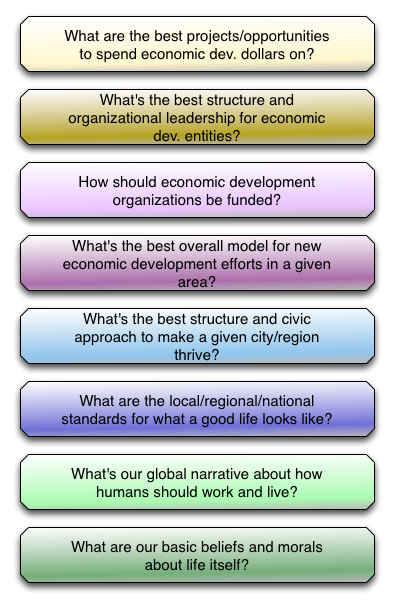 As many communities talk about economic recovery and future development, the conversation is often framed around the question, "what's the best investment of taxpayer dollars to achieve economic growth in our area?"
As many communities talk about economic recovery and future development, the conversation is often framed around the question, "what's the best investment of taxpayer dollars to achieve economic growth in our area?"
The question is scaled up and down - from "what's the best investment of the U.S. federal government's taxpayer-funded resources to recover from a down economy?" all the way to (in my local case) "how should Richmond and Wayne County, Indiana spend funds captured through the EDIT tax to develop the local economy?"
For many people, the question in that form doesn't have any problematic premises. But it's at least worth noting that there are some assumptions built in:
- That the government and/or economic development corporations are the best entities to facilitate economic development
- That taxpayer dollars should be used to fund economic development activities
- That economic development as traditionally defined is a good thing
And so on. Within each of those premises you can probably break them down further, e.g. if you ask people what economic development means, for some it's primarily "job creation" and for others its "improving quality of life" and for still others its "developing infrastructure."
The reality is that there are a number of layers to the conversation about economic development, most of them never touched or examined in the mainstream. We might visualize those layers this way:

In mainstream economic development conversations, I think we hover around the top two or three layers. Sometimes we get into questions of different overall models of economic development (in my own community, those who suggest ED organizations should be solely privately funded are considered to be on the fringe), but for the most part it's taken for granted that the way things have been done are the way they'll continue to be done. We rarely drill down to talk about what a "good life" for everyone in a given area looks like, what our responsibilities are to people trying to build a good life elsewhere, or how that relates to our narrative about human life should work in general, or about how that relates to our personal / religious / family / ancestral / academic philosophy about all life itself.
But the way we answer the questions at the lower layers will probably have a big impact on the way we answer the questions higher up.
A person who believes that humans are commanded by the divine to have dominion over all the earth might think differently about economic development from someone who believes humans are not necessarily any more blessed than other forms of life.
Someone who believes it's unjust to maintain a luxuriously high standard of living while other people live in extreme poverty or under constant threat of violence will have a different approach to community spending priorities than someone who has come to believe some people are naturally more deserving of wealth and privilege than others. And so on.
That's not to say that I think all conversations about economic development need to revisit or incorporate fundamental social, religious and philosophical debates. But I think it would be wise to make sure any given conversation about the best way to help the economy of a city or region thrive doesn't ignore these deeper layers, and the thinking that comes out of them.
If we really want to have an inclusive conversation that seeks out what will sustainably work well for a given community - instead of just swimming around in the implementation details of the same approach we've always had - we have to step back, drill down, and be willing to put aside the unchecked assumptions we've built our economic development work on up until now.
What assumptions are built into your views on economic development? What questions do you observe going unaddressed or unanswered in the conversations you're a part of?
 I’m a journalist, publisher, software developer and entrepreneur with experience as a founder and organizational leader. Work with me or learn more about me.
I’m a journalist, publisher, software developer and entrepreneur with experience as a founder and organizational leader. Work with me or learn more about me.